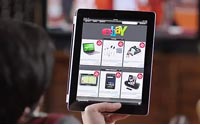 Americans are crazy about shopping
on tablets, and a new study reports that 49% of retailers say tablet shoppers spend more per order. And tablets now account for 3.2% of Web sales, compared with just 1.5% for smartphone
sales.
Americans are crazy about shopping
on tablets, and a new study reports that 49% of retailers say tablet shoppers spend more per order. And tablets now account for 3.2% of Web sales, compared with just 1.5% for smartphone
sales.
On average, stores are spending 3.9% of their total interactive marketing budgets this year on mobile advertising, according to the study, conducted by the National Retail
Federation’s Shop.org, in partnership with Forrester Research.
“Eventually, we expect that retailers will grow their mobile marketing budgets to address the fact that the
mobile channel has unique aspects, like location-triggered messaging, that can be compelling ways for brands to connect with shoppers,” writes Sucharita Mulpuru, a VP/principal analyst at Forrester.
advertisement
advertisement
The stores also say that they continue to rely primarily on email and search,
with 80% reporting they are the top two drivers of a company’s Web traffic, from either a smartphone or tablet. Typically, shoppers open 20% of emails on a campaign on either their phone or
tablet.
Scanning continues to grow in popularity, the study reports, with 75% of the chains saying they offer QR codes or other barcode scanning options. QR codes are most popular with
either very small retailers (those with $10 million or less in sales) or large ones (with annual sales of more than $100 million.) Mid-size retailers tend to rely more on mobile email optimization. QR
codes rank second.
The research is based on responses from 59 companies.
With more than 60 million expected to own a tablet by year-end, “retailers must continue to look
for unique ways to elevate their brand in such a competitive market,” writes Shop.org executive director Vicki Cantrell in the study. “Overall, we expect smartphone shopping adoption rates to stay low but fully
believe tablet sales will continue to change how retailers garner the attention of new and current customers.”
In addition to creating more apps for tablets, stores are also integrating
them into sales by placing them in the hands of associates. Macy’s, for example, announced this week that it would equip its jewelry sales associates with tablets. Sears already has iPads in
place at both its Sears and Kmart units, and Lowe’s has been experimenting with using iPhones in place of scanner guns -- all in an effort to help customers navigate online and in-store channels
more effectively.